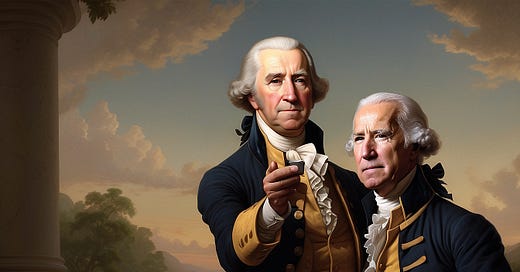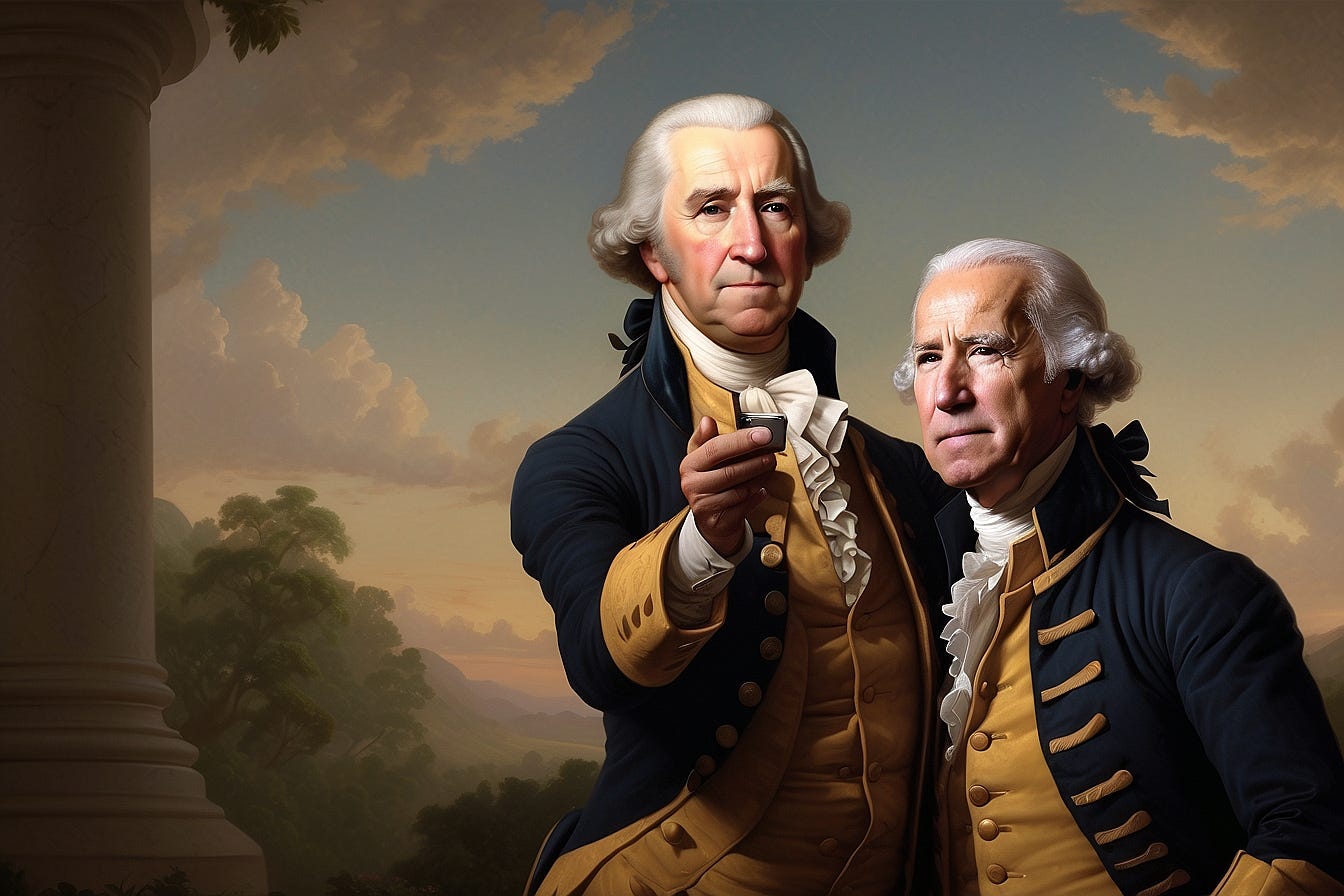Biden Bowing Out Has No Historical Parallel!
... and yet he's the fourteenth president to do it!
Both exclamations above are true.
The first is true because no event has any historical parallel.
The second is true because quite a few U.S. presidents—say about a third of the 46—have chosen not to seek another term for which they were eligible.
The first was George Washington. The choice was universal among two-term presidents for a long time (though some did consider and then reject another run), until FDR sought and won four terms. In response, in 1947, the two-term limit was constitutionally established.
A number of presidents haven’t even sought a second term*. In the nineteen elections since the limit was set, with two-termers no longer given the choice, three presidents have decided against going for two, now including Biden.
[*a bit of a gray area between “bowed out” and “sought”: a few ran for the nomination, but not very hard, just for show]
Yet Biden’s decision to step away—a bit, um, belatedly, I’d say—from the 2024 presidential campaign has been met by the fanbase (that’s what we have to call all political supporters now) with oceans of gushing astonishment at a unique display of matchless patriotism by a sacrificial figure whose self-denying decision, it’s said, to place his country above his own most profound personal desires will lift him, in the eyes of history, to the top ranks of presidents for all eternity.
I get why the party would want to go to some lengths to adopt an attitude of sheer gobsmacked awe at the transcendent greatness of a man who, until the other day, was the party’s presumptive—terrifyingly super-presumptive—nominee. It would be ridiculous to focus publicly, now, on the living hell Democratic officials and voters were put through, during those weeks that seemed like years, while the president and those around him denied the inevitable and left us to wonder if he might actually try to ramble around a sad, echoing, zombie-like coronation in Chicago, “a failed party and Jill running around trying to make it fun,” as a Dem friend in western Pennsylvania Trumpland grimly put it, in a text.
The job of the party is to generate good feelings and get out the vote, not dwell on what’s at best a pretty awkward and really rather precarious situation. People who I’m sure were grinding their teeth in frustration and calling the defensive, testy Biden names just last week are now fully bought into the idea that a new standard of principled leadership has been set by the incumbent Democratic president. In real life, it’s the only reasonable message.
I do not get, though, why a) some regular people and b) some liberal journalists and other intellectual types are taking this attitude.
You may be planning to vote Democratic. If you must, and these days everybody seems to feel they absolutely must, you may be using whatever your platform is to explain why, and try to persuade others to do so. But casting Biden’s decision—he was clearly unable to arrive at it without the most strenuous arm-twisting—in these fulsome terms of hero-worship and parallels to historic American acts of greatness or other such tears-inducing drama is supremely embarrassing when it’s coming not from a mass-party marketing strategy with few other options but from people supposedly observing and analyzing and thinking critically about highly fraught situations.
They say quoting NPR is like shooting fish in a barrel.
I’m in!
TAMARA KEITH: . . . And we know that [Biden] is expected to deliver remarks later this week at the LBJ Presidential Library. Lyndon Johnson was the last Democratic president to step aside instead of seeking another term.
MARY LOUISE KELLY: So such rich symbolism there.
Ah.
Symbolism, you say. And rich, at that.
What, then, are these symbols of which you speak?
[dead air]
Whoever decided that Biden should talk at the LBJ library must have been expecting to get liberal commentary to come up with just that kind of history-esque ornamentation. No fear that anybody in the on-air chat is going to bring up the grisly nightmare at home and abroad that was 1968 (no historic parallels—but maybe some vaguely disturbing resonances?). No, just a gesture at the idea of richness and symbolism. No actual symbolism in sight.
There’s emotion, and we don’t know how it feels. There are mystic chords of memory, and we don’t know what we remember.
Oh, wait, maybe we remember this . . .
MARA LIASSON: And he gets to go out as the George Washington of his party.
(The who? of his what?)
. . . you know, the encomiums have been pouring out about what a wonderful president he is. I think in Chicago, he's going to be a beloved elder figure
Sure—inform people he’s George Freaking Washington and why wouldn’t he be beloved, and a figure? He’s already elder.
That’s the news, to quote Merle Haggard, but the George Washington thing is big elsewhere too. Here’s a young Australian left activist named Drew Pavlou, on Twitter:
Roman statesman Cincinnatus relinquished total power to retire to his farm
George Washington could have been a king but voluntarily resigned after two terms
Like these great heroes, Joe Biden has put the good of the country before his own political interests
Thank you Joe
That’s got fantasies about Cincinnatus, Washington, and Biden all rolled up in one weepy package. To leave the poor Ancient Roman alone for a change: In real life, what Washington really could have done is run again—he didn’t believe in term-limiting the presidency—and win, though probably with diminishing support, die in office, and be replaced by a vice president.
And yet there’s this prevailing idea that, instead, one fine day near the end of two exhausting terms as president, with his memory, hearing, patience, and stamina weaker every day (Biden the Washington of his party? this historic resonance may not be our friend!), the first president might have decided, all of a sudden, had he not been so great, to call home the poor excuse for an army he’d sent west, cancel the election, haul himself astride a white horse, and lead a takeover of the country, overturning the Constitution in favor of a monarchy in order to spend what was left of his life doing . . . what? . . . exactly? what that he couldn’t have done better at home?
Worse is that historians like this Washington romance too. It's worse because they’re historians, so they step even more deeply into the . . . into the subject.
(licensed image copyright mac4tu at DeviantArt)
Here's a Twitter thread by Dr. Lindsay M. Chervinksy, on July 22:
Today I start as the Executive Director of the George Washington Presidential Library. I plan to spend a lot of time talking about Washington’s decision to step away from power. It was a radical act in 1783. It was revolutionary in 1797. And it remains extraordinary in 2024.
For all those grumbling about delay or resistance, I get that Biden isn’t Washington. But context is everything. GW left office in the same era that Napoleon escaped Elba. Biden stepped away in the same era that his opponent staged a violent coup to overthrow an election.
Parallels. Same-era stuff. Napoleon and Trump in one corner, Washington and Biden in the other.
How the mighty are fallen, I guess, but aren’t historians—even at presidential libraries—supposed to teach, at least once in a while, against the text? Context is everything… A radical act… The tone is so serious and informed, and yet the content adds up to nothing but a more involved version of the same old unquestioning fanperson stuff.
Chervinsky’s thread inspired a fellow historian, Craig Bruce Smith, to intone, in a quote-tweet over her thread, “Washington giving up power in 1783 remains the most radical and important act in American history.” You know the guy in a meeting who repeats, though less nuanced to the point where it makes no sense at all, a point a woman just made?—this one sounds almost like a troll, but Smith means it. He's talking about Washington’s resigning his commission as commander of the Continental Army, as is Chervinsky when she mentions 1783. There’s a bit more to work with there than with refusing to seek a third term—the victorious Washington wasn’t yet totally spent. But come on.
In 1783? Giving up power over what?
The man was not an idiot.
Chervinsky’s original thread concludes:
I rarely attempt to predict the future as my business is the past, but I am confident that the choice to leave is what will be remembered in history books, not the bickering in the preceding weeks.
Maybe.
I guess it’ll depend on what kind of history books people in the future like to read, and what they think history is.
(Lewis Lapham: 1935-2024)




The gushing, exuberant gratitude over the past week has been hard to take, especially when coming from the same people that demanded that Biden step aside. Like demanding a deserved refund, then being gushingly grateful when it’s delivered. A nod and a thank-you would do.
The young reporter, Bill Hogeland, who with his young wife rented a house in Muthaiga from Bill and Roberta Fonville when they moved to Khartoum in the early 1970s is one and the same as William Hogeland of Bad History.? I am asking as I would like to connect the trajectory of the young reporter. I was once Roberta Fonville, Montgomery is my maiden name.